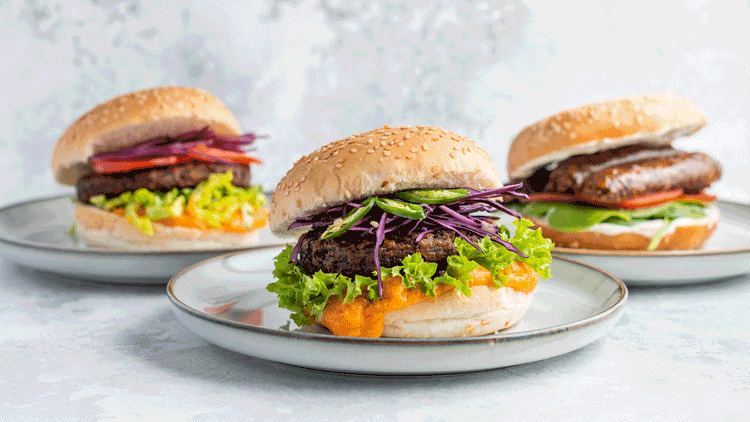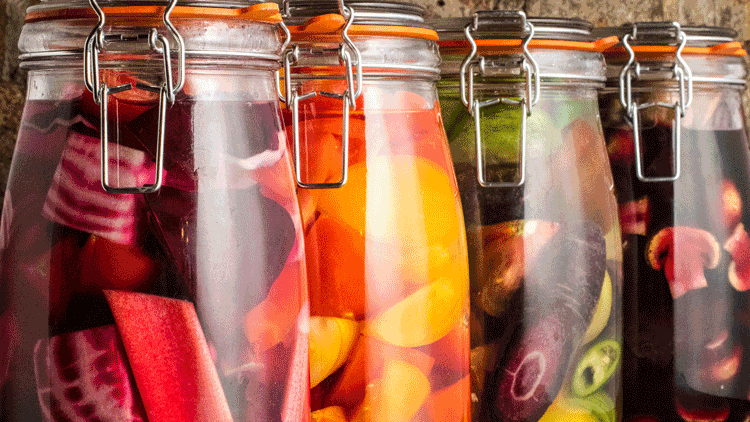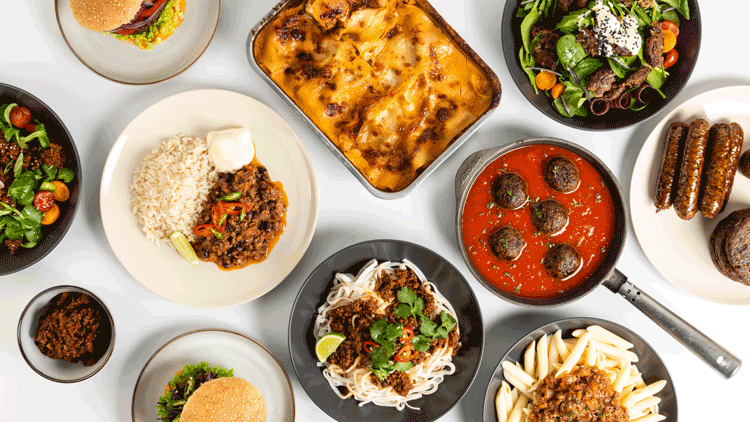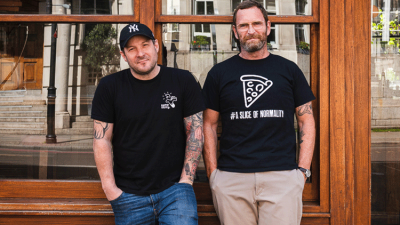Funghi(s): the trio harnessing the power of fermented mushrooms

If, a few years back, you had to name one chef who you wouldn’t dream of spearheading the meat-free movement with a range of plant-based foods then Neil Rankin would be that man.
Alongside chefs such as Fergus Henderson, Hawksmoor’s Richard Turner, and Salt Bae, Rankin, who has held key roles at meaty establishments including PittCue, Smokehouse and Temper and who literally wrote a book called How to Cook Meat, is a chef who has made a name for himself perfecting the art of cooking animal protein.
Yet here he is extolling the virtues of a nduja alternative made from fermented tomato pulp as we sit down over a pizza at Homeslice in London’s West End. Something feels amiss.
It’s an observation that is not lost on Rankin, nor is it one that particularly concerns him. After all, who better to create a viable alternative to meat that people will want to eat, and which restaurateurs would be happy to grace their menus than a chef whose raison d’etre up until a few years ago has been catering for carnivores?
And create a viable alternative he has. Rankin is the founder of Symplicity foods, a UK-wide supplier of meat-free foods including sausages, burgers and mince to the restaurant industry - and soon direct to consumers – that came to life in 2019 when he began experimenting with fermented vegetables for ways to create a plant-based burger that was an entirely different proposition to the headline-grabbing, soy-based likes of the Impossible burger. Symplicity’s mantra is to help chefs, restaurants and home chefs reduce their reliance on meat with products that offer the flavour and depth of protein, but which are also sustainable and, where possible, support local agriculture.
“As a chef, I’m never going to give you powders to cook with, my first thought is I’m going to give you some nice ingredients,” says Rankin. “That line of thought could only come from a chef. Food companies think ‘this is really popular, we’ll put a spin on it’ but I’m coming at this from a chef’s point of view. Flavour wise it delivers.”
A restaurateur’s view
The aforementioned pizza is plant-based nduja, Tenderstem broccoli and chilli and garlic oil, and is one of a number of vegan options on Homeslice’s menu but the first to showcase Symplicity’s products. The whopping 20-inch creation takes up the entire table when it is put down by the server for myself, Rankin, and Homeslice co-founder Alan Wogan to share. Wogan is not here just to ensure quality control, but to discuss why he and his brother Mark are now part of the Symplicity journey.
As restaurateurs themselves the Wogans are well aware of the growing demand for vegan dishes. Their interest in what Rankin was working on was piqued during a pop-up event in Greece that Homeslice was doing and at which Rankin was also present, representing his (now closed) Shoreditch plant-based burger restaurant Simplicity Burger, and the partnership stemmed from there.
"When you’ve got a company that’s all
about local produce you don’t want to then
be buying something from California
which has ingredients from India and China"
“We were curious,” says Wogan. “We started talking about operating a business and then lockdown happened, and we had some time for cooking and development.”
Despite being in the restaurant business, Homeslice wasn’t the first to order the products. That honour went to Bleecker Burger, and was quickly followed by groups including Soho House, Pastaio and Dishoom, which uses Symplicity’s sausages for its vegan sausage naan roll. US burger player Shake Shack even flew a team in from New York to come and taste Rankin’s products, which eventually led to the burger brand collaborating with him on its crispy shallot burger. Since then, its products have been taken on by restaurant groups including Burger & Lobster, Drake & Morgan, Mildreds, Gordon Ramsay’s Street Burger, Richoux and even top hotel Corinthia London.
So how has Symplicity captured the imagination of so many restaurant groups serving a wide range of cuisines? Rankin says that unlike other plant-based options on the market, such as burgers including Beyond Meat and Moving Mountain, Symplicity takes a bespoke approach.
“We go into businesses and find out what they need and if we can make it, we will. Also, it’s a really easy product for chefs to use.”
A different approach
A major difference between Symplicity’s products and those of its rivals is down to the fermentation process they undergo. Tomatoes, beetroot, onions and chestnut mushrooms (button are too watery, ceps and shitake impart too much of a mushroomy flavour, according to Rankin) are fermented to develop a umami flavour often associated with meats such as pork and beef.
“Everything vegan you eat or drink that tastes good is because it is fermented,” insists Rankin. “Don’t get me wrong, vegetables are delicious on their own in a salad but when you cook them you need that acidity.”
The company’s zero-waste ethos is another selling point. Often, Symplicity’s products are made from ingredients that would fail the beauty parade in order to be entered into the food chain and which might otherwise be thrown away. As Rankin says: “I don’t care what the veg looks like because we’re going to mince them. As long as they have flavour and come from a good supplier it’s great.”
Where possible ingredients are sourced locally – some of its wheat is sourced from Germany and the Ukraine - with the company even planning to work with farmers and grow its own produce in the future.
“There’s such a need within the restaurant community and with the big chains especially for [plant-based] stuff. They are often forced into buying products they really don’t want to use. When you’ve got an ethical company that’s all about using UK produce and buying locally you don’t want to then be buying something from California which has ingredients from India and China. It doesn’t make any sense. There is less of a concern in retail, but there is one in restaurants.
“For my conscience it’s using farmers and agriculture that’s already there and not some monocrop protein from South American or Canada to try and fill a gap.”
Rankin talks about how in the future the company could even take excess stock from supermarkets, ferment it and then put it back through their supply chain as products. “It almost becomes a food waste processing centre.”
Beyond this, many of the company’s products are by-products of earlier creations. Its sauces, which include burger; garlic and basil; and truffle and black pepper, are made using the fermented tomato water leftover from the burger making process, while products such as its chorizo and lamb mince are made from leftovers.
“The goal is to get to a point where it’s all local and we make it all ourselves. In the same way that Temper was nose to tail, the nduja only came about from leftover bits from the manufacture of the burger.”
Another contributing factor to Symplicity’s future success will be the recent introduction of calorie labelling on menus in large restaurant groups. The clean label nature of the products and the fact that they are high in protein but low in fat and calories is already proving to be a selling point, with Symplicity’s burgers comparing very favourably with other more calorific plant-based burgers on the market.
Wogan says that a switch to using Symplicity’s products has cut the calorie count of some of its dishes by up to two thirds. “Being able to produce a clean label product is where we’re getting a lot of new interest.”
“The other stuff is clever,” adds Rankin, referring to his plant-based competitors. “It’s great they can stick pea protein through a 3D printer and it comes out like a steak - but if it’s not bringing joy or wellbeing then I’d rather eat a steak.”
Room to grow
Growth so far has been steady, but Symplicity appears to be on the verge of going gangbusters. Initially operating out the back of a kitchen in Fitzrovia the operation has since moved to a production facility in London’s Park Royal thanks to investment for a minority stake from a venture capitalist Frontline Ventures (there is no connection with Rankin, whose Twitter handle happens to be Frontline chef). It currently has two units, but it is soon to take on a third as demand ramps up. Sausages that were once handmade are now produced in machinery that makes 600 each minute and the company buys around two tonnes of mushrooms each week.
“The process of accreditation has been quite a journey from being restaurateurs to going into food production,” admits Wogan. “A lot came as a surprise to us. The difference from getting food to a customer from a restaurant kitchen and a production facility has been a steep learning curve - we’ve had to hire a lot of expertise - production managers, quality assurance - all the things that as restaurateurs we have no experience in. It’s been amazing but completely different.”
The investment will enable the company to move to its next stage of growth, selling directly to consumers and eventually into retail. A consumer-facing e-commerce business is due to go live in June and the company is looking to partner with brands that are in retail, such as Pieminister, to help create meat-free options. “That side is more exciting to me than just putting our products on shelves,” says Rankin. “You’ve got somebody who’s got great products and you’re sticking yours within that.”
“For my conscience it’s using farmers and agriculture
that’s already there and not some monocrop
protein from South American or
Canada to try and fill a gap”
When Symplicity’s products do hit the supermarket shelves, it might not be in the way many might imagine. Rather than going down the chilled route, which commands a premium, Rankin is looking to the freezer cabinets and even tins for its products.
“For me the next stage is getting it to be ambient. Most food waste is because people like chilled stuff, so if you’re going to make a waste-free product we need to address that. Frozen is looked down upon but there is less waste.”
Rankin says he’d like to emulate the success of premium canned fish, such as sardines and anchovies, but that he is also looking at aseptic packaging, with the first ambient products being tested in recyclable pouches.
“Our main customers are flexitarians. If they were just vegans it would be easy, but not everyone wants to eat meat free all the time so you need to give them a way that they can use small amounts.”
As to how big Symplicity could be, the duo are quite coy. With the company starting to be approached by the retailers a second, bigger site is inevitable with the original units being used to test products or even for it to make its own miso (a key ingredient), which Rankin says would be a first on these shores.
“Another big site is needed for retail,” says Wogan. “We have over 4,000sq ft at the moment working efficiently but where we are seeing interest from the bigger companies it will need to be a lot bigger than that.”
The company has also looked at potential production partners in Europe. “There is a much larger market out there that we are looking at with this product.”
“It’s been an interesting journey and we don’t know where it’s going to take us,” adds Rankin.
Does this mean the end of Rankin the restaurateur? Has he hung up his apron and meat cleaver for good? “No. I love restaurants,” is the quick-fire response. “Yes, I will open another one. I can’t not. But the idea of trying to make loads of money doing meat and barbecue, which is what I do, in this environment, I don’t know how to do that anymore.
“If I do open another place, it will be a small wine bar or a pub. I can’t see myself doing something really big or bold because it’s just fucking tiring.”
For the time being, at least, then the focus is on the fermented. For a man who has spent much of his professional career surrounded by meat, how does he feel about his new direction?
“Plant-based is a young market and people are quite judgy,” he says, no doubt recalling some of the raised eyebrows directed at him when he first announced Symplicity back in 2019. “It’s like judging the electric car market on the Sinclair C5 rather than waiting until you get to the Tesla stage.
“It is the next thing to happen. I don’t see meat getting wiped out in my lifetime, but I see this playing a much bigger role and we’ve got to progress.”











